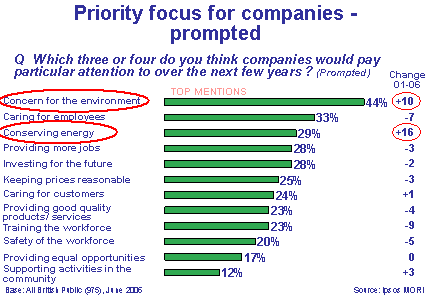Climate Change -- The Expected Role for Business
Public concern about climate change has doubled in the past year. Barely a day goes by without a media headline about the possible impacts. In the high street consumers are confronted with more sustainable choices -- HSBC is positioning itself as a green bank; Marks & Spencer has its Plan A. Arnold Schwarzenegger has traded movie stardom for instigating the US's flagship low carbon policy, while Al Gore, when not directing acclaimed documentaries on climate change, is organising global rock concerts for the cause.
So does the British public recognise an increasing priority for addressing climate change, and a distinct role for business in it? Overall, it is the Government that is seen by the public to be best placed to take responsibility for the issue, while companies are also considered to have the influence needed to help limit climate change. The past few years have seen environmental concerns and energy use rise up the priority issues that consumers feel businesses need to address.

But many consumers are also cautious of companies' green claims, and business faces several challenges in convincing consumers that their efforts go beyond 'spin'. Recent research highlights cases where environmental claims appear to be at odds with a company's modus operandi. This is true of several sectors, for example -- but not limited to -- banking, transport and oil, which may face some additional trust hurdles.
"If RBS or Citibank start saying, 'oh, we're just going to go in the organic, ethical [fields]', I just won't believe them because they simply can't be ethical."
Man, 25-35, AB
"To make huge amounts of profit margins, ethics have got to be pushed to one side to an extent, it's just as simple as that."
Man, 25-35, AB
Consumers still believe that financial and environmental objectives are diametrically opposed. Financial management is thought of as rational, pragmatic and individualistic, whereas the environment is idealistic, collectivist and involving self-sacrifice. There is an assumption that environmentally-friendly products are more expensive than other alternatives. Consumers also want more help in making sustainable choices, with three-quarters saying that it is difficult to differentiate products that are better for the environment, and a similar proportion agreeing that companies need to make ethical purchase choices easy.
Nevertheless, behaviours are already changing and there are some positive signals. The committed few are becoming larger in number and support impressive -- if still niche -- progress. Recycling is the success story to date, with rapid shifts in parts of the country. However, many of the current trends remain in the wrong direction and some behaviour -- such as driving and taking holidays abroad -- appears sacrosanct. The majority of consumers are not aware that some of their actions are associated with a large carbon footprint, e.g. high levels of meat consumption.
On the surface, the public say they're willing to do more and go further -- three-quarters agree with this sentiment. However, opt-outs and caveats play an important part in what they are willing to change and, as a result, actual behaviour lags behind intentions. As Gordon Brown has said, actual behaviour change is now the biggest challenge Britain faces. Several levers are potentially important to encourage people to act on climate change. There are opportunities to tap into the underlying drivers of consumption, whether financial, emotional, social or psychological. 'Descriptive norms' (which teach us how most people around us behave) and 'injunctive norms' (which alert us to what is sanctioned or frowned upon) can also be used to modify what is considered desirable. The role of collective action cannot be overstated -- half of the public agree they would try to do more on climate change if others did more as well.
So the public is torn between competing and conflicting mindsets. As citizens they want to avert climate change but, at the same time, as consumers they want to go on holiday, own a second home, a big car and the latest electronic goods. It seems that a range of measures, simultaneously, on a number of fronts will be required to encourage and enable the public to take action on climate change. Political leadership and vision will undoubtedly be required, and corporate engagement will also needed if behaviours are to be changed fast enough to take advantage of the rapidly closing climatic window of opportunity and ensure that climate change is constrained within 'safe limits'.
This article is based on Ipsos's report, Tipping Point or Turning Point: Social Marketing and Climate Change, produced to accompany our recent event examining public attitudes towards climate change.
For more information please contact Jenny Dawkins on +44 (0)20 7347 3087



